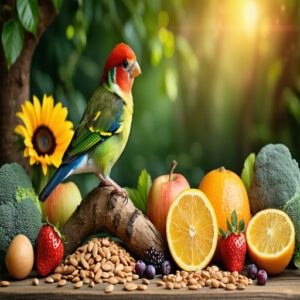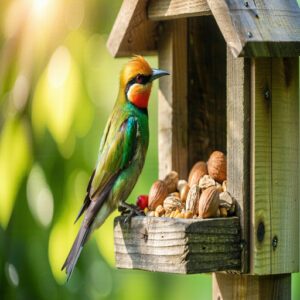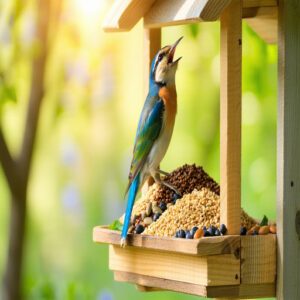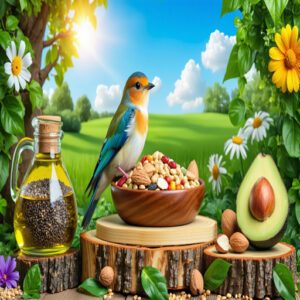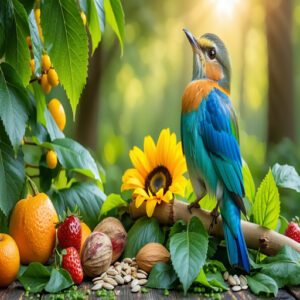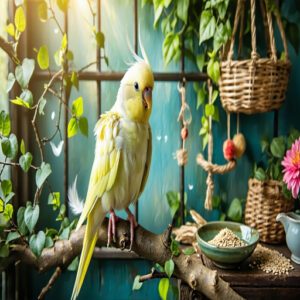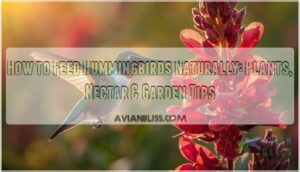This site is supported by our readers. We may earn a commission, at no cost to you, if you purchase through links.
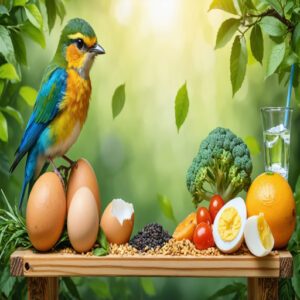
Offer your bird high-protein favorites like boiled eggs, mealworms, or even hemp seeds—think of these as the building blocks for new feathers.
Add some calcium-rich options, like crushed eggshells or cuttlebones, to keep their bones and feathers strong.
Leafy greens, carrots, and sweet potatoes supply necessary vitamins like A and D, while berries and oranges add a punch of Vitamin C.
A balanced diet helps, but don’t forget fresh water and a calm space—it’s tough losing feathers and looking fabulous at the same time!
Table Of Contents
- Key Takeaways
- Molting Season Nutrition
- Best Foods for Molting Birds
- Nutritional Needs During Molting
- Molting Bird Diet Essentials
- Supporting Feather Growth
- Molting Bird Care Tips
- Recognizing Molting Symptoms
- Creating a Molting Friendly Environment
- Molting Bird Health Considerations
- Optimizing Molting Season Health
- Frequently Asked Questions (FAQs)
- What do birds eat when molting?
- What should I eat during molting season?
- How can I Help my Bird molt?
- What can I eat if my feathers molt?
- What should a canary eat during molting?
- What should I Feed my molting chickens?
- What is the best food for molting birds?
- What do you give birds when molting?
- How to help bird molting?
- What time of year do most birds molt?
- Conclusion
Key Takeaways
- Feed your bird high-protein foods like boiled eggs, mealworms, and hemp seeds to support strong feather growth.
- Add calcium sources like crushed eggshells or cuttlebones to strengthen bones and new feathers.
- Include vitamin-rich veggies like carrots, spinach, and sweet potatoes along with fruits like oranges and berries to boost overall health.
- Provide fresh water daily and create a calm, stress-free space to keep your bird comfortable during molting.
Molting Season Nutrition
Your bird’s diet during molting season can make or break their feather growth. Focus on high-protein foods, vitamins, and minerals to keep them strong and looking fabulous.
High Protein Foods
When your bird’s molting, they need high protein foods to grow strong feathers.
Try these molting bird food options:
- Egg Nutrition – Scrambled or boiled eggs are packed with protein.
- Seed Options – Sunflower seeds and hemp seeds provide a nutritious boost.
- Protein Diet Extras – Offer mealworms or small bits of cooked chicken as meat supplements.
Feathers need fuel!
Vitamin Rich Foods
Feather growth vitamins are just as important as protein.
Bright fruits and veggies offer a powerful boost.
Try these Vitamin Sources for molting bird food:
| Vitamin | Food Supplements | Nutrient Boosters | Feather Enhancers |
|---|---|---|---|
| Vitamin A | Carrots, sweet potatoes | Leafy greens | Bell peppers |
| Vitamin D | Hard-boiled eggs | Fortified pellets | Sun exposure (controlled) |
| Vitamin C | Oranges, berries | Broccoli | Kiwi |
| Vitamin E | Almonds, sunflower seeds | Kale | Spinach |
Make these snacks part of your molting bird food list!
Mineral Supplements
Strong feather growth needs solid mineral intake—think calcium, magnesium, and iron.
Calcium is a must for healthy feathers and bones, so toss in dark leafy greens like kale and spinach or crushed eggshells.
Bird nutrition supplements with feather growth vitamins can fill gaps, a little extra mineral love goes a long way for bird wellness during molting season!
Best Foods for Molting Birds
What’s the best way to help your bird thrive during molting? Focus on high-protein bird food, like eggs, quinoa, or mealworms.
These protein sources are key for Feather Nutrition, giving your bird the building blocks needed for new growth.
Nutritious bird seed, such as blends with Nyjer or sunflower seeds, also provides essential oils to condition feathers. Don’t skip healthy treats like shredded cucumbers and leafy greens—they’re packed with vitamins A and E.
Bird nutrition supplements, including calcium, can boost feather strength and overall health. Consider specially formulated molting supplements for extra amino acid support. The best bird feed combines variety and nutrition; your feathered friend gets all they need while enjoying their meals.
A favorite snack? Sprouted seeds! For ideal results, choose High Protein options to support feather growth and overall well-being.
Nutritional Needs During Molting
Molting takes a lot out of your bird, so it’s vital to feed them a diet packed with the right nutrients.
Extra protein, calcium, and vitamins like A and D can make all the difference in helping those new feathers grow strong and healthy.
Protein Requirements
Feather growth during molting demands extra protein.
Birds burn through their nutrient needs fast, so high-protein bird food like mealworms, suet, or Nesting SuperBlend is a must.
Providing a high protein diet is essential for supporting birds during this process.
Protein sources fuel amino acids, helping feathers rebuild stronger.
Protein supplements or nutritious bird seed with a boost of methionine and lysine can work wonders for bird molt support.
Don’t skimp here!
Calcium Intake
While protein helps feathers grow strong, calcium is the backbone of bone health and great for feather strength.
Birds in molting season need extra calcium for mineral balance and eggshell quality—if they lay. For more information on calcium rich foods that support their health, consider consulting a reliable resource.
- Load up on leafy greens like kale and bok choy.
- Offer calcium supplements or cuttlebones.
- Treat them with sesame seeds or almonds.
- Add oranges or dried figs sparingly.
Vitamin a and D
Calcium does wonders, but don’t skip Vitamins A and D for superior bird nutrition.
A boosts vision and skin, while D guarantees strong bones and feather health.
Understanding essential vitamins is vital for maintaining prime bird health during molting season.
Add leafy greens, carrots, and hard-boiled eggs to their molting supplements.
For extra avian wellness, try fortified pellets. These simple bird health tips keep your feathered friend looking sharp and feeling great!
Molting Bird Diet Essentials
Your bird needs a hearty, balanced diet during molting to stay healthy and grow strong feathers.
Fresh fruits and vegetables, seeds, and healthy fats are essential for giving them the energy and nutrients they need.
Fresh Fruits and Vegetables
Fresh produce can work wonders during molting season.
Think veggie delights like shredded carrots or leafy greens such as spinach and kale—they’re packed with vitamins.
Berry benefits? Blueberries and strawberries are crowd favorites, bursting with antioxidants. A fresh fruit blend can provide essential nutrients for peak health.
Mix in fruit variety like apple slices or melon chunks for healthy bird treats. These bird nutrition tips keep feathers growing strong with leafy greens and antioxidants.
Whole Grains and Seeds
When your bird’s shedding season hits, whole grains and seeds pack a punch in their diet.
They’re filled with nutrient value, fiber content, and are essential for boosting energy.
Mix in variety to keep things interesting!
- Quinoa: High protein bird food for molting.
- Chia seeds: Omega-rich seeds.
- Oats: Great fiber source.
- Buckwheat: Easy-to-digest whole food.
- Millet: Perfect snack for molting birds.
Healthy Fats and Oils
Beyond seeds and grains, healthy fats play a starring role in your bird’s molting diet.
You’ll want to include omega-3 fatty acids for healthy skin and feathers – try drizzling some chia seed oil over their food.
Mix in avocado pieces or sprinkle in flax seeds to boost their nutrient balance.
Keep fatty acid portions between 5-15% of their daily diet for ideal feather growth and molting support.
Supporting Feather Growth
You’ll need the right mix of nutrients to help your feathered friend grow strong, healthy feathers during molting season.
Just like you’d want a balanced meal to feel your best, your bird needs protein-rich foods and essential vitamins to replace those falling feathers with beautiful new ones.
Amino Acids and Proteins
Your molting bird’s feathers are practically crying out for amino acids and proteins – they’re the building blocks of healthy plumage.
Focus on lysine and methionine-rich protein sources like eggs, dried mealworms, and black soldier fly larvae.
Try mixing Naturewise® Feather Fixer into their diet for balanced bird nutrition. For the best molting food results, sprinkle some brewer’s yeast on their daily feed to boost nutrient balance naturally.
Omega-3 Fatty Acids
Omega-3 fatty acids have incredible fatty acid benefits during the molting season.
They strengthen feathers as well as support avian nutrition and immune health.
Include these omega-rich foods:
- Chia seeds for plant-based strength.
- Fish oil supplements designed for birds.
- Flaxseed oil for easy mixing.
- Walnuts as a natural treat.
Antioxidants and Vitamins
Vitamins and antioxidants are like the backstage crew for feather health—they keep everything running smoothly.
Vitamin A supports skin and feather growth, while vitamin E fights stress with its antioxidant role.
Add colorful veggies like carrots and spinach to their plate, boosting bird molting wellness, this bird nutrition advice guarantees molting birds’ diets stay packed with the right nutrients for vibrant feathers.
Molting Bird Care Tips
Caring for a molting bird means paying attention to their comfort and overall well-being.
Simple changes like providing clean water, keeping humidity levels steady, and reducing loud noises can make your feathered friend’s molting season much easier.
Providing Fresh Water
Feather growth takes energy, so hydration is key during molting season.
Always offer fresh sources like clean bowls or bird hydrators.
Water quality matters—stagnant water can harm bird health.
Whether it’s songbirds or waterfowl, a steady supply keeps them thriving.
Hydration tips? A sprinkle of electrolytes in water can boost recovery.
Happy birds, healthier feathers!
Maintaining Humidity
Keeping humidity levels steady is a game-changer for molting birds.
Dry air can irritate their delicate skin during the molting season.
Try using a water spray or small fog systems to improve air quality, mimicking a natural environment.
Aim for mist levels that keep things comfortable but not soggy—your bird deserves fresh feathers and good health!
Reducing Stress
Molting can make birds cranky, so your job is keeping things calm.
Quiet spaces work wonders for bird relaxation, reducing stress from loud noises or sudden moves.
Gentle handling is key—skip unnecessary handling if your bird seems irritable.
Stress management also includes creating calm environments and even using a bird calming formula to help them through molting season more peacefully.
Recognizing Molting Symptoms
You might notice scattered feathers around the cage or new pin feathers poking through your bird’s skin like tiny quills.
Changes in appetite, moodiness, or increased naps can also mean your bird’s working hard to grow fresh feathers.
Feather Loss and Pin Feathers
Feather loss during molting season might leave your bird looking scrappy, but it’s all part of the process.
Pin feathers, those tiny, prickly-looking feather buds, signal new growth.
Bird plumage often appears dull or patchy, especially in early molting stages, and to support healthy feather growth, you should offer protein-rich bird food for shedding, ensuring your bird regains its vibrant plumage quickly.
Changes in Behavior
Your bird might act a little funny during molting season.
Bird stress and molting anxiety often lead to behavioral shifts like moodiness or social withdrawal.
Feather plucking or becoming less playful is common too.
Understanding the bird molting process is essential for providing the right care.
These behavioral changes are just your bird’s way of coping with the energy-draining molting process.
Patience and proper molting bird care can help them feel more at ease.
Appetite and Sleep Patterns
Molting fatigue often shows up as unusual eating habits and disrupted sleep cycles.
Birds might nap more often or seem less energetic, focusing heavily on food intake to fuel feather growth.
If you notice irritability paired with scattered feathers, it’s normal.
Follow a bird feeding guide loaded with extra protein and vitamins to support the molting season care they need.
Creating a Molting Friendly Environment
Creating a calm, comfortable space can make a world of difference for a bird during molting.
You’ll want to focus on stable temperatures, soft lighting, and plenty of peace to keep stress levels low.
Temperature Control
Feather loss during molting leaves birds more sensitive to temperature fluctuations.
Keep their space cozy—avoid cold exposure or excessive heat stress.
Aim for steady temperature regulation, especially if you’re in shifting climate zones.
Birds thrive when thermal regulation is consistent during molting season, so skip drafts, and don’t overuse heaters.
Stable warmth equals happier, healthier feather growth!
Lighting and Shade
Good lighting can make or break your bird’s molting comfort.
Mimic natural light by using full spectrum lighting to support health.
Balance UV exposure with shaded spots to avoid overheating.
Adjust lighting cycles or use dimming options to match day length.
Birds thrive with consistent routines and thoughtful shade effects to ease their stress.
- Provide shaded perches for cooling off.
- Use full spectrum bird lighting for feather health.
- Avoid harsh UV exposure by balancing sunshine.
- Monitor lighting cycles for stability and comfort.
Quiet and Peaceful Space
Think about how loud distractions can unsettle your bird during molting season.
Creating quiet zones with calming environments helps reduce stress and supports feather growth.
Establishing a quiet zone is essential for minimizing disruptions.
Minimizing noise—like keeping TVs low or avoiding rambunctious play nearby—goes a long way in bird wellness.
A peaceful area lets your bird focus on rest, an absolute must for better molting care.
Molting Bird Health Considerations
You’ve got to keep an eye on your bird’s health during molting since infections, parasites, and nutritional deficiencies can sneak up on them.
Paying attention to their diet and behavior now will help them grow those new feathers without extra stress.
Infections and Diseases
Fresh feathers are great, but molting can weaken your bird’s defenses.
Understanding bird molting patterns is vital for providing the best care during this sensitive period.
Stress, poor nutrition, or crowded environments may lead to fungal infections like aspergillosis or viral outbreaks like avian pox.
Bacterial infections, such as Staphylococcus, can follow.
Watch for respiratory issues or digestive trouble.
Strong nutrition and a clean, calm space help keep bird diseases at bay.
Parasites and Pests
Feather loss from bird molting can leave your bird vulnerable to pests like mites, fleas, ticks, and lice.
These pesky critters irritate their skin and slow feather growth.
Regular pest management, like flea control sprays or mite removal powders, keeps them comfy and healthy.
Pair tick prevention with a strong molting birds diet to support feather regrowth and overall bird care.
Nutritional Deficiencies
Ever wonder why your bird seems off during molting?
Nutritional deficiencies could be to blame.
Malnutrition risks arise when dietary gaps leave birds lacking key nutrients for feather growth.
Deficiency symptoms like poor digestion or weak feathers signal trouble.
A molting birds diet needs balance—protein, vitamins, and feather growth supplements guarantee proper nutrition for birds.
Follow bird nutrition guidance to help!
Optimizing Molting Season Health
You can keep your bird healthy during molting by focusing on balanced nutrition, proper hydration, and regular check-ups.
Don’t forget to provide plenty of mental stimulation to keep them happy while they’re growing those new feathers!
Regular Check-Ups
A quick trip to the vet during molting season works wonders for bird care.
Regular health checks help spot issues like infections or nutritional gaps, and feather inspections reveal whether new growth is on track, and adjustments to molting schedules can keep things smooth.
Veterinary care guarantees your bird’s health monitoring stays solid, supporting strong feather growth and stress-free molts.
To prepare for such visits, consulting a pet bird vet checklist is highly recommended.
Monitoring Nutrition and Hydration
A bird’s diet during molting season thrives on nutrient balance.
Focus on food variety—like high-protein seeds, calcium-rich greens, and vitamin-packed veggies—to meet changing dietary needs.
Hydration levels matter, too! Clean, fresh water keeps hydration up and stress down.
Prioritize water quality by changing daily. A well-rounded bird diet guarantees molting birds stay healthy and ready to show off those new feathers!
Providing Mental Stimulation
Keeping your bird’s mind active during the molting process can reduce stress and improve behavior.
Try these ideas:
- Bird Toys: Rotate items like foraging toys to keep things fresh.
- Mental Exercises: Teach simple tricks or hide treats for them to find.
- Environmental Enrichment: Add perches or mirrors to their space for exploration.
A busy bird is a happy, healthy bird.
Frequently Asked Questions (FAQs)
What do birds eat when molting?
Did you know feathers are 85% protein?
During molting, birds need high-protein foods like eggs, quinoa, or mealworms.
Toss in veggies like spinach for vitamins and sunflower seeds for healthy fats to keep them thriving.
What should I eat during molting season?
During molting season, focus on boosting your protein intake with foods like eggs, quinoa, and lean meats.
Add colorful vegetables for vitamins and nuts for healthy fats.
Stay hydrated and aim for balanced, nutrient-rich meals!
How can I Help my Bird molt?
Helping your bird molt smoothly means giving extra protein-packed foods, like eggs or quinoa, and fresh veggies for vitamins.
Keep baths ready to ease itching, offer a calm space, and watch their mood closely!
What can I eat if my feathers molt?
You need protein-packed foods like hard-boiled eggs, sprouted seeds, or quinoa to grow those feathers back strong.
Toss in leafy greens like kale and veggies like carrots for vitamins—and don’t forget fresh water to hydrate!
What should a canary eat during molting?
During molting, your canary needs protein-packed foods like boiled eggs, egg food, and small seeds.
Add leafy greens like spinach for vitamins and cucumbers for hydration.
A cozy space and daily baths also help.
What should I Feed my molting chickens?
Molting chickens need extra protein and nutrients.
Offer scrambled eggs, mealworms, sunflower seeds, and high-protein feed.
Toss in leafy greens and veggies like spinach or cucumbers to boost vitamins.
Fresh water is a must too!
What is the best food for molting birds?
Did you know feathers are 85% protein?
Feed your molting bird boiled eggs, cooked quinoa, or mealworms for a protein boost.
Add spinach, sunflower seeds, and carrots for vitamins, and keep fresh water handy!
What do you give birds when molting?
Give your bird high-protein foods like eggs, quinoa, or sprouted seeds.
Toss in colorful veggies for vitamins, and don’t forget fresh water.
A calm, comfy space helps them chill while their feathers grow back.
How to help bird molting?
Create a calm, stress-free space and keep fresh water available.
Offer high-protein foods like eggs or mealworms and vitamin-rich veggies.
Regular baths reduce irritation, while maintaining stable lighting and temperature helps your bird stay comfortable.
What time of year do most birds molt?
Most birds molt in late summer or early fall, typically after the breeding season.
This timing helps them grow fresh feathers before colder weather hits, ensuring they’re ready for migration or surviving cooler months.
Conclusion
Did you know birds can lose up to 25% of their feathers during molting season?
That’s why offering the best bird food for molting season is essential to help them bounce back.
Focus on high-protein options like eggs or mealworms, along with calcium, vitamins A and D, and leafy greens.
Keep their water fresh, their space peaceful, and their diet balanced.
Supporting your bird now sets them up for vibrant, healthy feathers and a happy, stress-free season!

